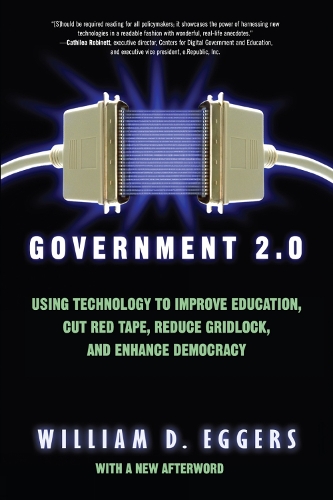
Government 2.0: Using Technology to Improve Education, Cut Red Tape, Reduce Gridlock, and Enhance Democracy
(Paperback)
Publishing Details
Government 2.0: Using Technology to Improve Education, Cut Red Tape, Reduce Gridlock, and Enhance Democracy
By (Author) William D. Eggers
Bloomsbury Publishing PLC
Rowman & Littlefield Publishers
9th July 2007
United States
Classifications
General
Non Fiction
Central / national / federal government
352.38702854678
Physical Properties
Paperback
310
Width 154mm, Height 228mm, Spine 23mm
472g
Description
Unhyped and therefore unnoticed, technology is altering the behavior and mission of city halls, statehouses, schools, and federal agencies across America. From transportation to education to elections to law enforcement (or, as we're now referring to it, "homeland security"), the digital revolution is transforming government and politics, slashing bureaucracies; improving services; producing innovative solutions to some of our nation's thorniest problems; changing the terms of the Left/Right political debate; and offering ordinary people access to a degree of information and individual influence until recently accessible only to the most powerful citizens, finally redeeming the Founding Fathers' original vision for our democracy, and enriching American life and society in the process.
Based on interviews with over 500 leading politicians, researchers, technology industry CEOs and leaders, futurists and front-line public employees, Government 2.0 journeys across America and overseas to demonstrate the promise and perils of this emerging world and offer a likely road map to its implementation. You'll hear from technology executives preparing for an onrushing future when, for many citizens, most government interactions could take place on private-sector websites; from bureaucrats like OSHA's Ed Stern fighting to get their agencies to adopt expert systems technology; from William Bennett, whose virtual education company offers a glimpse into one possible future of American education; and from Governor Jeb Bush and former Mayor Rudolph Giuliani as they endeavor to overcome bureaucratic inertia to provide more open, efficient, and effective governments.
Rich with anecdotes and case studies, Government 2.0 is a must read for every entrepreneur frustrated by paperwork, every parent who's sick of being surprised by bad report cards, every commuter stuck in traffic, every activist trying to fight City Hall, and every taxpayer who cares about the future of government.
Reviews
In this important book, William Eggers shows convincingly just how much promise technology holds for making government more efficient, transparent, and responsive to its citizens. Eggers displays a keen understanding of policy-making in the digital age. Accompanying his insightful policy prescriptions are invaluable tips for putting the ideas into practice. Government 2.0 is a great contribution to freedom and democracy. -- Bill Owens, Governor of Colorado
Government 2.0 should be required reading for all policy makers; it showcases the power of harnessing new technologies in a readable fashion with wonderful, real-life anecdotes. The information is vital for anyone helping to chart the political, cultural, and economic future of our country. -- Cathilea Robinett, executive director, Centers for Digital Government and Education, and executive vice president, e.Republic, Inc.
Bill Eggers effectively identifies that democracy in America today is increasingly being played out by everyday citizens in front of computer screens. He shows that political leaders can be in constructive two-way conversations with their constituents if they understand the dynamics of today's technologies. -- R. T. Rybak, Mayor of Minneapolis
Bill Eggers is one of the country's leading experts on government reform. I have been reading and listening to him for a decade, since I first was elected mayor of Indianapolis. His new book, Government 2.0, provides a major contribution to the public policy debate. -- Stephen Goldsmith, former Mayor of Indianapolis, former Chair of the Corporation for National and Community Service, and Professor of Government at the John F. Kennedy of Government at Harvard University
Every year, more governments are using technology to become more user-friendly and transparent for citizens, and, ultimately, more effectivemoving from old-style patronage politics to performance politics. Government 2.0 is a great place to start for government leaders who want to make the right choices to have the biggest impact. -- Martin O'Malley, Mayor of Baltimore
The author makes a compelling case that state and federal government agencies have been slow to benefit from the digital revolution. -- Current Affairs * Forecast *
The scope of [Eggers's] work is ambitious. Eggers surveys major government services from schools to security, and offers a detailed overview of the ways in which technology isor could betransforming government from a centralized behemoth into a responsive entity, offering the kind of personalized, flexible service we've come to expect from private firms. -- Megan McArdle, columnist, Washington Post * New York Post *
Author Bio
William D. Eggers is senior fellow at the Manhattan Institute and global director for Deloitte Research, Public Sector in Washington, D.C. He is the coauthor of Revolution at the Roots: Making Our Government Smaller, Better, and Closer to Home (1995), which won the Sir Anthony Fisher International Memorial Award, and Governing by Network
The New Shape of the Public Sector (2004), winner of the 2005 Louis Brownlow Book Award. He splits his time between Austin, Texas and the Washington, D.C. area.
